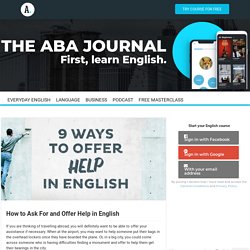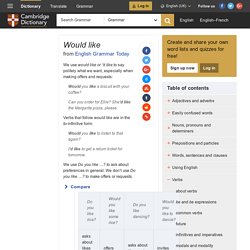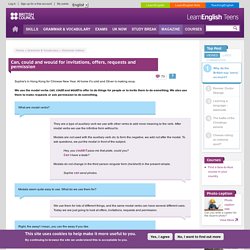

Requests and Permission. There are many ways of making requests and asking for permission in English.

Consider these situations: Conversation 1 John and Sandra are a couple on holiday in Paris and John goes up to a stranger: John ‘Excuse me, sorry to bother you, would you mind taking our picture?’ Stranger ‘No not at all. Where would you like to stand?’ Sandra ‘Here’s fine. Conversation 2 Paul needs to ask his boss for permission to leave work early the next day: Paul ‘Mr Clark.’
Conversation 3 Harry needs to make a call but his phone battery is flat. Conversation 4 Pat and Anne are classmates. These are a few ways to ask permission or make a request. ‘Would you mind taking our picture?’ Each different structure depends on the relationship between the people involved and the nature of the request. 1 and 2 are more formal than 3 and 4. How to Ask For and Offer Help in English. If you are thinking of travelling abroad, you will definitely want to be able to offer your assistance if necessary.

When at the airport, you may want to help someone put their bags in the overhead lockers once they have boarded the plane. Or, in a big city, you could come across someone who is having difficulties finding a monument and offer to help them get their bearings in the city. But the opposite can also be true. What happens if you are at the airport and can’t find your gate or have had an accident and need assistance? It is common to ask for and offer help – that is why you should know how a number of different ways to do so in English. Offering Help in English In some languages, there is not a wide variety of expressions that can be used to offer assistance. Here we have created a list of expressions you can use to offer help in English, starting with the most formal.
Intermediate Grammar – Questions and requests with modal verbs. Hyvää huomenta, (that’s “Good morning” in Finnish).

The following lesson is for intermediate students. If you are not sure of your English level, take our test! You can find all this information, plus speaking, writing, vocabulary exercises and more on the ABA English Course Unit 53 – Fashion Café. Do you have pen and paper? Let’s start… Offering help Imagine you walk into a shop. However, if you enter a very expensive shop, then the assistant might say: “May I help you? Both mean the same thing, the only difference is that “may” is more formal than “can”.
Modals to express offers. Modals – permission and obligation. Learning English. Learning English. Asking Polite Questions for ESL Students. Some questions are more polite than others.

Here are the three main question types in English. Each of these question types can be used to form polite questions. Follow the suggestions to use each form politely. Here's a quick overview of the three types of questions in English: Direct Question Direct questions are either yes/no questions such as Are you married? Direct questions go right to the question and include no extra language such as I wonder or Can you tell me ... Construction: Direct questions place the helping verb before the subject of the question: (Question word) + Helping Verb + Subject + Verb + Objects? Where do you work? Making Direct Questions Polite Direct questions can seem impolite at times, especially when you are asking a stranger. Does the tram stop here? It is certainly correct to ask questions in this manner, but it's very common to make these types of questions more polite by adding 'excuse me' or 'pardon me' to begin your question. Excuse me, when does the bus leave? Would like - English Grammar Today - Cambridge Dictionary.
We use would like or ’d like to say politely what we want, especially when making offers and requests: Would you like a biscuit with your coffee?

Can you order for Ellie? She’d like the Margarita pizza, please. Modals of Probability. BBC World Service. BBC World Service. Can, could and would for invitations, offers, requests and permission. We use the modal verbs can, could and would to offer to do things for people or to invite them to do something.

We also use them to make requests or ask permission to do something. They are a type of auxiliary verb we use with other verbs to add more meaning to the verb. After modal verbs we use the infinitive form without to. Modals are not used with the auxiliary verb do; to form the negative, we add not after the modal. To ask questions, we put the modal in front of the subject. Hey, you couldn't pass me that plate, could you? Modals do not change in the third person singular form (he/she/it) in the present simple. Sophie can send photos. Modals seem quite easy to use.
We use them for lots of different things, and the same modal verbs can have several different uses. Right, fire away! Oh, you’re giving me permission.